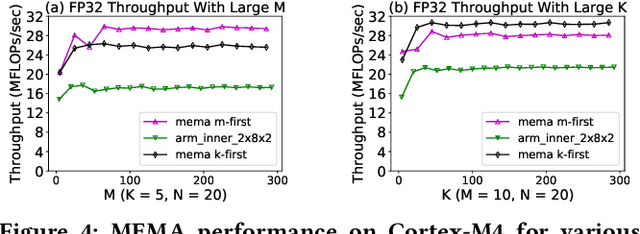Wei-Te Ting
MEMA Runtime Framework: Minimizing External Memory Accesses for TinyML on Microcontrollers
Apr 12, 2023



Abstract:We present the MEMA framework for the easy and quick derivation of efficient inference runtimes that minimize external memory accesses for matrix multiplication on TinyML systems. The framework accounts for hardware resource constraints and problem sizes in analytically determining optimized schedules and kernels that minimize memory accesses. MEMA provides a solution to a well-known problem in the current practice, that is, optimal schedules tend to be found only through a time consuming and heuristic search of a large scheduling space. We compare the performance of runtimes derived from MEMA to existing state-of-the-art libraries on ARM-based TinyML systems. For example, for neural network benchmarks on the ARM Cortex-M4, we achieve up to a 1.8x speedup and 44% energy reduction over CMSIS-NN.
Lightweight Detection of Out-of-Distribution and Adversarial Samples via Channel Mean Discrepancy
Apr 23, 2021



Abstract:Detecting out-of-distribution (OOD) and adversarial samples is essential when deploying classification models in real-world applications. We introduce Channel Mean Discrepancy (CMD), a model-agnostic distance metric for evaluating the statistics of features extracted by classification models, inspired by integral probability metrics. CMD compares the feature statistics of incoming samples against feature statistics estimated from previously seen training samples with minimal overhead. We experimentally demonstrate that CMD magnitude is significantly smaller for legitimate samples than for OOD and adversarial samples. We propose a simple method to reliably differentiate between legitimate samples from OOD and adversarial samples using CMD, requiring only a single forward pass on a pre-trained classification model per sample. We further demonstrate how to achieve single image detection by using a lightweight model for channel sensitivity tuning, an improvement on other statistical detection methods. Preliminary results show that our simple yet effective method outperforms several state-of-the-art approaches to detecting OOD and adversarial samples across various datasets and attack methods with high efficiency and generalizability.
 Add to Chrome
Add to Chrome Add to Firefox
Add to Firefox Add to Edge
Add to Edge